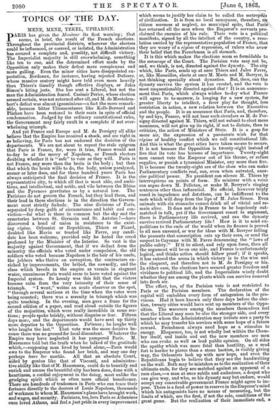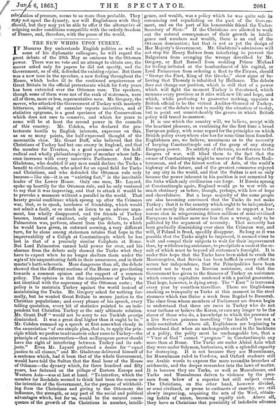TOPICS OF THE DAY.
MENE, MENE, TEKEL, UPHIRSIN. PARIS has given the Moniteur its first warning; that seems' in brief, the result of the French elections. Throughout the provincial districts, wherever the electors could be influenced, or coerced, or isolated, the Administration has secured a complete and, possibly, not difficult victory. The Imperialist majority is still overwhelming, something like ten to one, and the determined effort made by the Opposition only makes their defeat more conspicuous and more galling. Even the minor cities have disappointed ex- pectation, Bordeaux, for instance, having rejected Dufaure, whose massive oratory might have told even more heavily than Thiers's tinselly though effective displays, or Jules Simon's biting jests. She has sent a Liberal, but not the man the Administration feared. Casimir Perier, whose election seemed certain, was not returned after all, and M. de Montalem- bert's defeat was almost ignominious—a fact the more remark- able, because bitter Ultramontanes like Kolb-Bernard and Plichon have been restored to their seats in spite of official condemnation. Judged by the ordinary constitutional rules, the Government may fairly exult in a complete if not over- whelming triumph.
And yet France and Europe and M. de Persigny all alike believe that the Empire has received a shock, and are right in ao believing, for Paris has not endorsed the decision of the departments. We are not about to repeat the stale epigram that Paris is France, for, were it true, France would not to-day be at the mercy of Napoleon, or French electors doubting whether it is "safe" to vote as they will. Paris is not France, any more than the brain is the body; but then that which the brain wills to do, the body, unless paralyzed, sooner or later does, and for three hundred years Paris has always anticipated the final decision of France. It is the representative city, to which all that is most able, and ambi- tious, and intellectual, and noble, and vile between the Rhine and the Pyrenees gravitates as by a natural law. The Parisians do not govern the French, but they lead them, and their lead in these elections is in the direction the Govern- ment most strictly forbade. The nine divisions of Paris, separated by deep gulfs of circumstance and habit and con- viction—for what is there in common but the sky and the cemeteries between St. Germain and St. Antoine ?—have discovered a bond of union in resistance to the exist- ing regime. Orleanist or Republican, Thiers or Picard, doubted like Ravin or trusted like Fevre, any candi- date has been welcome, provided only he hated the creed professed by the Minister of the Interior. So vast is the majority against Government, that if we deduct from the minority the officials who voted under compulsion, the old soldiers who voted because Napoleon is the heir of his uncle, the jobbers who thrive on corruption, the contractors en- riched by improvements, the bribed, the cowardly, and the class which breeds in the empire as vermin in stagnant water, unanimous Paris would seem to have voted against the Imperial system. So keenly was this felt that the victors became calm from the very intensity of their sense of triumph. "I went," writes an acute observer on the spot, "through several sections at the time when the votes were being counted; there was a serenity in triumph which was quite touching. In the evening, men gave a franc for the second edition of a paper, and read aloud outside the figures of the majorities, which were really incredible in some sec- tions; people spoke briskly, without disguise or fear. Fifteen days more, and the departments would have sent up thirty more deputies to the Opposition. Patience; he laughs well who laughs the last." That vote was the more decisive be- cause there was no ground for local discontent. Whatever the Empire may have neglected it has pampered Paris. M. Hausmann told but the truth when he talked of the gratitude which,—supposing man lived by bread alone,—Paris would owe to the Emperor who found her brick, and may one day perhaps leave her marble. All that an absolute Court, aided by genius like that of Visconti, and administra- tive ability like that of M. Hausmann, could do to beautify and enrich and amuse the beautiful city has been done, done with a heartiness, a cordial enjoyment in the doing, most unlike the grudging spirit which so often mars official beneficence. There are hundreds of tradesmen in Paris who can trace their fortunes directly to the decrees of Louis Napoleon, thousands of workmen to whom M. Hausmann's plans have brought work, and wages and security. Parisians, too, love Paris as Athenians once loved Athens, and feel a just pride in every improvement which seems to justify her claim to be called the metropolis of civilization. It is from no local annoyance, therefore, no citizen soreness at neglect, no municipal spite, that Paris has returned all the men whom the Emperor's servants pro- claimed the enemies of his rule. Their vote is a political manifesto, signed by all the intellect of the country, a reso- lution carried by the representative population of France, that they are weary of a rigime of repression, of rulers who avow their belief that the Frenchman is all stomach.
It is this which makes the elections seem so formidable to the entourage of the Court. The Parisian vote may not be, and, we think, is not, directed against the dynasty. The city which, like Paris, sends up at once Thiers and Jules Fevre, or, like Marseilles, elects at once M. Marie and M. Berryer, is not thinking specially about dynasties. But, then, can the dynasty survive the system it has created, and the vote is most unquestionably directed against that It is an announce- ment that Paris, which always wishes to-day what France will agree to to-morrow, is longing for a new system, for greater liberty to intellect, a freer play for thought, less restriction in action, a new relation between the Executive and the people. It is an assurance that Paris, and, therefore, by and bye, France, will not bear such circulars as 31. do Per- signy directed against M. Thiers, will not submit to elect mere nominees, will not give up its right, if not to dictate, then to criticize, the action of Ministers of State. It is a gasp for more air, the expression of a passionate wish for that regime of healthy conflict which we call constitutional life. And this is what the great cities have taken means to secure. It is not because the Opposition is twenty-eight instead of five that its vote has become of importance. Twenty-eight men cannot vote the Emperor out of his throne, or refuse supplies, or punish a tyrannical Minister, any more than five. It is because the twenty-eight are of the class who can make Parliamentary conflicts real, can, even when outvoted, exer- cise political power. No president can silence M. Thiers by interruptions on points of form. No minister with a voice can argue down M. Pelletan, or make M. Berryer's ringing sentences other than influential. No official, however triply cased in impudence and dotations, can be indifferent to the mots which will drop from the lips of M. Jules Simon. Even animals with six stomachs cannot drink oil of vitriol and re- main alive. It does not do in France to be hopelessly out- matched in talk, yet if the Government resort to argument, there is Parliamentary life revived, and can the dynasty survive revived Parliamentary life ? How is it to send ex- peditions to the ends of the world when its finance is proved to all men unsound, or war for ideas with M. Berryer telling the peasants that conscription eats up their sons, or send the suspect to Cayenne with M. Fevre denouncing the "laws of public safety." If it be silent, and rely upon force, then all the argument will be on one side, and France is unfortunately logical, and thinks action should follow proof; if it speaks, it has entered the arena in which victory is to the wise and the eloquent, and therefore not to M. de Persigny or his. In either case, the elections have secured greater freedom and vividness to political life, and the Imperialists wisely doubt whether they are among the plants which can survive removal into fresh air.
The effect, too, of the Parisian vote is not restricted to Paris or the Parisian members. The declaration of the capital will embolden every form of antagonism in the pro- vinces. Had it been known ouly three days before the elec- tion, twenty cities would have sent up members of the Oppo- sition. The waverers among the members themselves feel that the Liberal may soon be also the stronger side, and every member whom the Administration may irritate sees a party to which he may transfer his services with some hope of a future reward. Frenchmen always need hope as a stimulus to energy. Eloquence, too, is not wholly lost within the Cham- ber itself, and inside and out the new members are men who can evoke as well as lead public opinion. On all sides the apathy which was more fatal than hostility, as a .mud fort is harder to pierce than a stone bastion, is visibly giving way, the Orleamsts look up with new hope, and even the Republicans begin to believe that they see the handwriting on the wall. Both may be Mistaken as to the realization of their ultimate ends, for they are metaled against an opponent of a rare class,—a man at once subtle and audacious, a despot who can give way, and who, so his dynasty may but endure, would accept any conceivable government France might agree to im- pose. There is a fund of power in reserve in the Emperor's mind which his antagonists have no means of measuring, but the limits of which, are the first, if not the sole, conditions of the great game. But the realization of their immediate end, a ation of pressure, seems to us more than probable. They y not upset the dynasty, nor will Englishmen wish they ould, but they may yet be able to offer it the alternative of reigning under conditions compatible with the orderly freedom of France, and, therefore, with the peace of the world.































 Previous page
Previous page